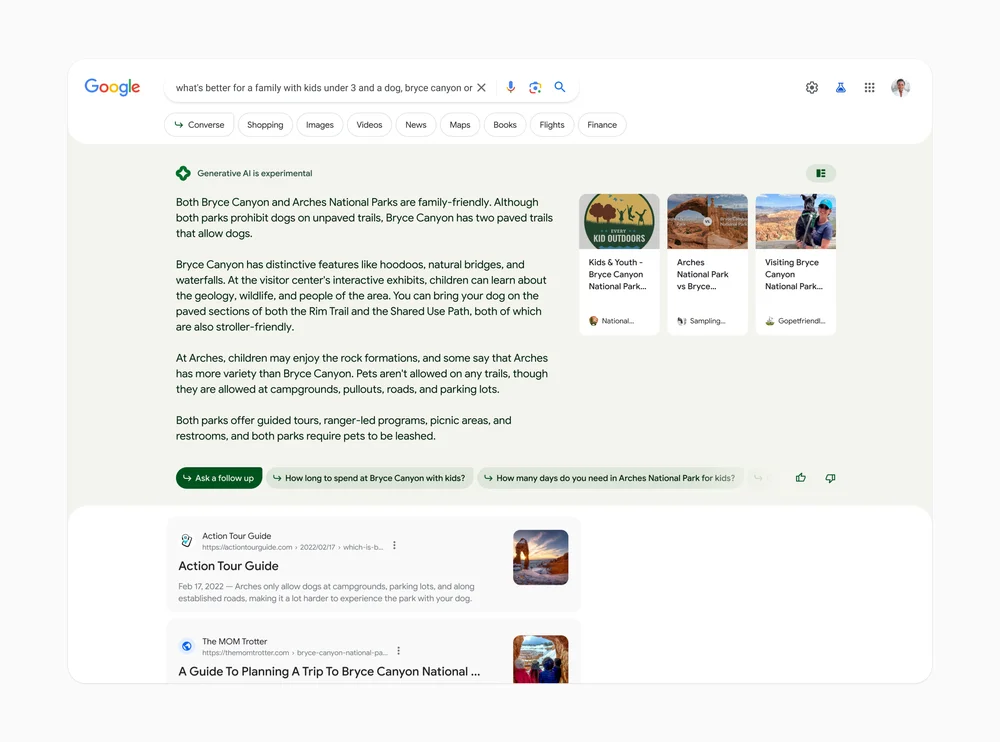How to succeed in SEO in the SGE era

Google is currently testing the new SGE assistant in 120 countries and seven languages. If deployed globally, the Search Generative Experience (SGE) will revolutionize the search experience – and will also have a significant impact on site visibility and traffic. Dagmar’s Head of SEO Jussi-Pekka Kettunen gives the first tips on how to optimize in an AI-based search engine – and what is the worst tactic.
In the future, we will no longer think about how to get to the top of search results, but how to get included in the answers generated by AI in the first place.
Jussi-Pekka Kettunen, Head of SEO, DagmarA time of great change
On 14.5.2024, Google announced at Google’s I/O event that it will bring SGE to the US market. Until now, SGE has only been in limited test use in 120 countries and seven languages. Now, search engine optimizers around the world are thinking about how the reform will affect site visibility and traffic.
In 2024, Google’s search engine will change perhaps more than ever before in the last 10 years. SGE, or Search Generative Experience, brings generative AI to Google’s search engine to deliver a completely new search experience. Thanks to SGE, Google can be asked more complex and descriptive questions, much like ChatGPT or Copilot in the Bing search engine.

According to a survey conducted in January 2024, up to 87 percent of searches generated results generated by SGE.
In practice
- The SGE search results included 10.2 links from four different domains
- Up to 94 percent of generatively generated links were pages outside the TOP 20 rankings
- The largest generatively generated search result had up to 37 new URLs ahead of traditional organic search results.
If Google were to publish the SGE in its current form, one could legitimately say that the time of ten blue links is over.
(The study used 1,000 different search terms from 10 different verticals in the U.S. The study is expected to be repeated once Google launches the SGE globally.)
How does a marketer fare in the SGE era?
The GEO study, published in November 2023, gave some indication of how to prepare for the SGE era. The researchers tested nine ways to optimize AI-based search engines.
The best were
- Citing sources
- Add expert citations to texts
- Add statistics
Citing sources increases the reliability of the content also in the eyes of the reader. When AI tools have made content production seemingly effortless, sources give credibility.
I’ve been saying for a long time that writing for websites is often like writing a research article: a summary at the beginning, clear heading levels and references to sources.
Adding expert comments to the text not only increases reliability, but also raises the authority of the site over the topic being discussed, especially if the topic is strongly associated with the person being interviewed.
As a rule, adding statistics always brings some new information to the existing one.
In June 2022, Google was granted the Information Gain Score patent, one of the purposes of which is to increase the visibility of pages that bring new information to an existing conversation.
Of course, new information alone is not enough, it must also be presented in a search engine-friendly way.
Studies are always great link magnets. Although links are no longer the most important factor affecting visibility, they should not be completely forgotten in search engine optimization as a whole.
Oh yes.
Guess what turned out to be the worst tactic? Add the number of search terms to your content. According to the study, search term optimization performed 10 percent worse than baseline.
So stop thinking about how many times a search term needs to appear in your content.
It is now worth looking at texts in a new way. Utilizing a question-and-answer format can improve the likelihood of getting AI answers. Many publishers have already done so.
Keep these in mind in the SGE era:
- Cite sources, add expert commentary and/or use statistics.– Always bring something new to an existing conversation.
- Increasing the number of search terms in your content negatively affects organic visibility.
- Use a question-answer format.
stop thinking about how many times a search term needs to appear in your content.
Dagmar’s SEO team will help you prepare for your time at SGE
We have long used experts in our article productions. We ask them to quote from the texts, which we can use to strengthen the impression that the content is reliable. We often get new or different views on the topic from experts, which helps us develop visibility. In addition, we may communicate to Google in several ways the expertise of the citor.
Note, however, that a completely different view from the mainstream may not rank well in search engines if you are aiming for a very popular and well-known topic.
We refer to external sites, which links your page more closely to the subject and thus increases reliability in Google’s “eyes”. Sources can also be located on your own site.
For me, the most inspiring thing is to refer to studies. At Dagmar, we have our own research department, whose expertise our SEO team utilises whenever needed. What could be a stronger combination than a search engine-friendly article that provides new research data. It can be shared, for example, on social media channels and distributed in different media, while collecting referrals from other sites organically.
Remember the January 2024 study I referenced earlier in this story? That one page has received 275 referrals from other sites to date (and one more from me).
Pretty impressive.
Contact us to learn more about how you can prepare your site for a new era!
AUTHOR

Head of SEO
jussi-pekka.kettunen@dagmar.fi
LinkedIn
Head of SEO, Jussi-Pekka, is an economist who has become obsessed with SEO and climbing. His free time is also spent learning photography and image editing.
Sources
Aggarwal, P., Murahari V., Rajpurohit, T., Kalyan. A., Narasimhan, K.R. & Deshpande A. GEO: Generative Engine Optimization, 16 Nov 2023.
O’Toole, L. 2024. Research Study – The Impact of Google’s Search Generative Experience on organic rankings. Haettu: 16.2.2024.
Read more articles
-
 Vattenfall’s B2B website is clearer and more readableThe collaboration between Dagmar and Vattenfall‘s B2B marketing Energyplaza started already in November 2023. We…See our work
Vattenfall’s B2B website is clearer and more readableThe collaboration between Dagmar and Vattenfall‘s B2B marketing Energyplaza started already in November 2023. We…See our work -
 Dagmar studied: Search behavior changes with media consumption – Search Everywhere Optimization and Social Search are a new way of thinking about search engine optimizationAre you first in the search results when half a million Finns search YouTube for…Read the blog
Dagmar studied: Search behavior changes with media consumption – Search Everywhere Optimization and Social Search are a new way of thinking about search engine optimizationAre you first in the search results when half a million Finns search YouTube for…Read the blog -
 Technical SEO: 10 Technical SEO stumbling blocks to addressWithout a solid foundation in technical search engine optimization, even the best content will remain…Read the blog
Technical SEO: 10 Technical SEO stumbling blocks to addressWithout a solid foundation in technical search engine optimization, even the best content will remain…Read the blog